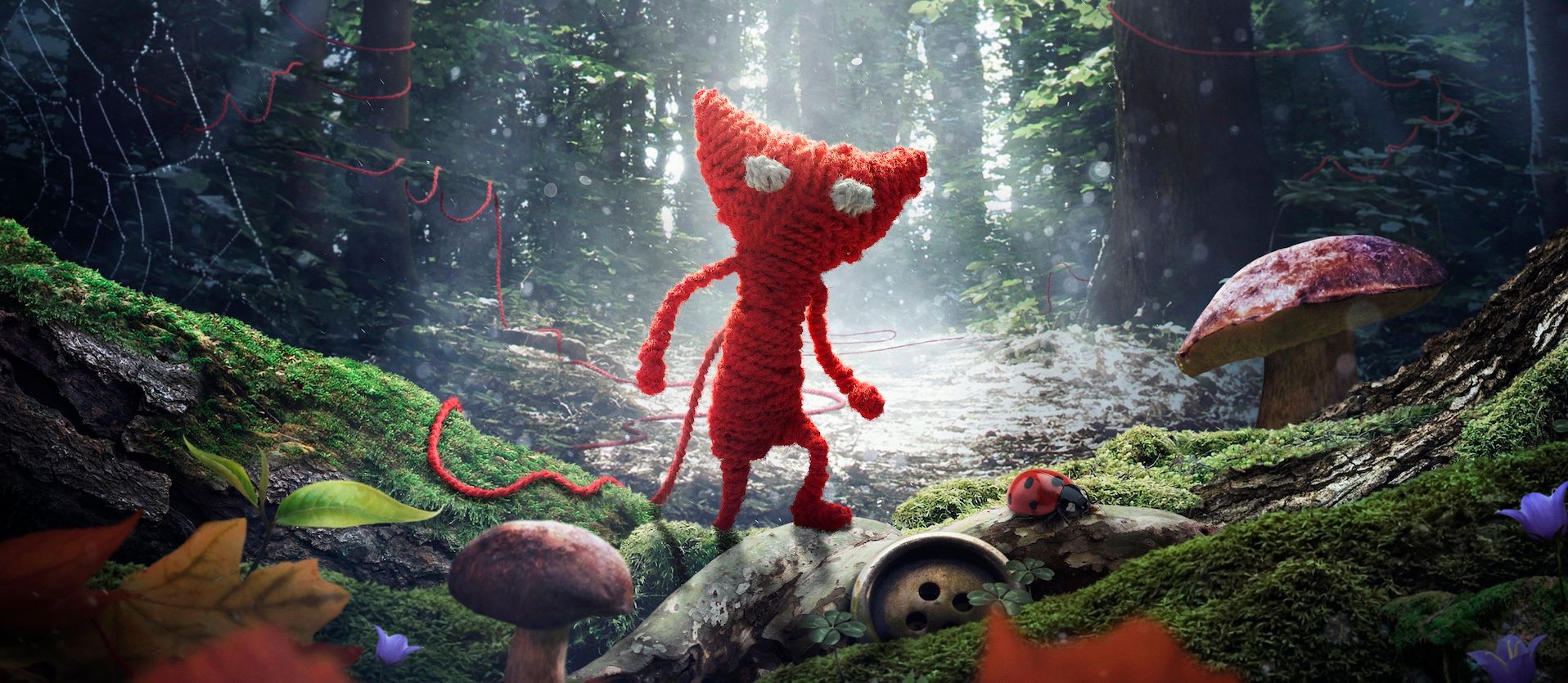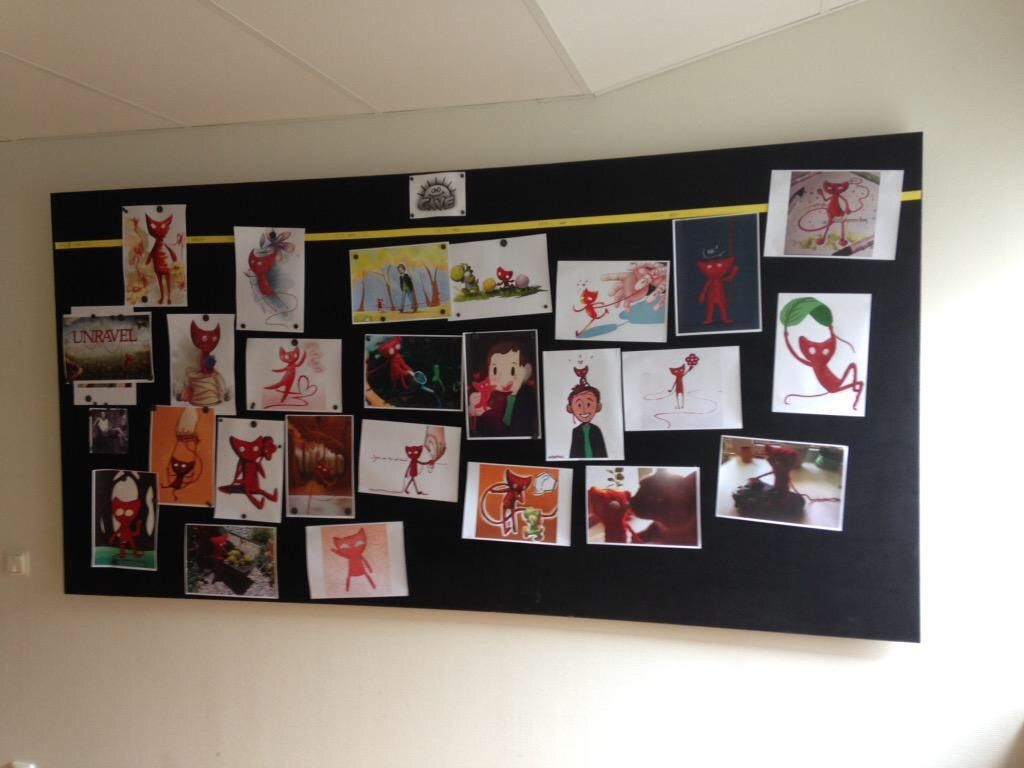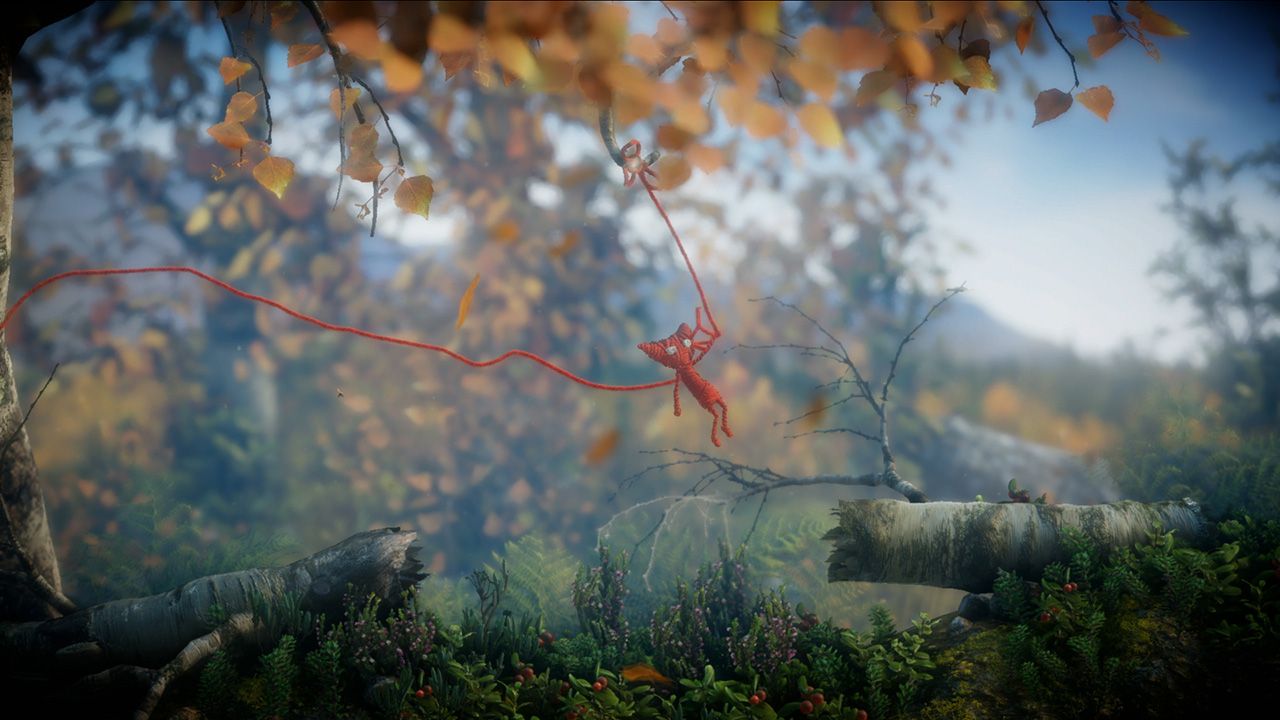Speaking about that disparity between your previous games and this one; you've made ski games, snowmobile racing games, an online multiplayer golf game, a fitness game and a motion controlled fighting game. Was the transition to developing Unravel a difficult one for the studio?
[Martin Sahlin] Yes and no. It wasn't difficult in the sense that everyone was keen on doing it. It was slightly difficult in some parts. Like this whole thing about trying to tell a story without telling it in an overt manner. We're trying to do it subtly through details that are in the level. So we have to make sure that everything we make is there for a reason and has something to say. I think we've gotten to the point now where all that stuff is clicking and it's working. I guess there was a transition into it where you have to remember that we're not doing stuff just to do them, we're doing them because they actually tie into a greater whole. They're part of this experience, this journey. We have to make sure it fits. On the whole, I would say that it's been just a purely positive experience. Everybody has been really keen on doing it and doing it right.
[Dick Adolfsson] I think, because we did all those sell-out games, I mean the skiing games and the golf game and every one of those you listed; they were all something that was ordered from someone else. No one loved those projects. So this felt like the first project that you felt "this could be something cool. I want to do this. I want to make a real game for once."
[M.S] It's also like, in all those other games, they're purely about mechanics. It's like they're just toys. I think it's important for games to be toys -- that they're actually fun to play -- but the thing about them, was that they were just fun. They didn't have any kind of depth to them. [Martin pauses before continuing] and some of them weren't even that fun. [Laughs]
[D.A] They weren’t fun to work with and they weren't fun in the end. I mean, it's always a good experience to have gone through a project and you learn a bunch of stuff, but you can't love everything you work with. This project, it felt like everyone just got into it at a really early stage and just loved what they did.
So Dick, what was your reaction when Martin came in and said "oh, we're making a Yarn based adventure?"
[D.A] I think at first we were wondering what the game would feel like or what we were supposed to do. He had a lot of photos of this yarn character and everyone was like "oh, it's adorable! This is so great!" but we didn't understand how the mechanics were supposed to work. That's something that had to grow from ideas and sketches and testing. I think that was one of the key things. That we had time to just try things out. It was like “What is it supposed to be?” rather than have a complete document telling you every detail, it was more like “emotionally, this is what the game will be about”' and the setting. Then we had to — together — work it out.
Puzzle platformers aren't generally in lists of most anticipated upcoming titles, so were you surprised at the huge amount of interest and the anticipation that this game has generated?
[M.S] Yeah. When we went to E3, we went with a pretty positive feeling; that demo was really polished. Also, that we actually managed to keep it a secret. That was pretty fun. Normally I'm not a fan of secrecy, but in this case I think it really worked in our advantage. Then, even though you have good feeling going there, of course it's a surprise to see people react the way that they did. I don't think you can ever really prepare for that.
After the reveal and people seeing more gameplay, there have been comparisons to games like LittleBigPlanet. What do you think of those comparisons?
[M.S] It's flattering of course; I think LittleBigPlanet is awesome. I don't think that our game plays that much like LittleBigPlanet. It's just more like it's on the same scale, roughly. Neither the controls nor the gameplay are that similar. I'm flattered by the comparison because I just think they are really great games. Nothing exists in a vacuum; everything is always inspired by everything. So if people see similarities, then fine. It's not really important as long as they have fun with the game.
[At this point Martin makes Yarny jump over a hole and a crab comes out]
I nearly missed that crab there as you went past there. It's really cool.
[M.S] I was actually thinking that we should make a sea based game just so we can do more sea creatures because it was really fun to make that crab. It's actually ridiculously over-detailed [laughs]. If you zoom in close you can see that the mouth actually opens and it has these little mandibles and stuff.
So someone spent way too long on that crab?
[M.S] [laughs] Yeah but it was fun, so it was worth it.
It seems like yarn is making a bit of a run at pop culture and even gaming. With games like Yoshi's Woolly World and a few others, you could say it is a newly arrived genre of games. Do you think you guys can top the genre?
[M.S] Well, I think our game plays really differently to those other games. It's nice because it has its own kind of feel with the things you can do. You can swing on the yarn and make stuff out of it. It plays like Unravel.
[D.A] Something made of yarn, people can relate to. The cuteness can be related to. I think that's a big selling point. Something fluffy and soft, something you play with as a child.
You mention relating to the character. Martin, in past interviews you've spoken about how it's important for people to empathize with the character. How did you go about putting that concept into the gameplay?
[M.S] I think a big part of it is the moves and animations and stuff. Really working on the reactions like when he gets wet and he shakes the water off. As you can see, as we progress, [Martin gestures to the game as he plays it] now Yarny has shifted into a different stance where he is kind of like “hmm I wonder what I should be doing here”. So we have all these little subtle nuances always going on with the character. We get to these later levels where he is in the cold, and huddled up and freezing, or when he is happy, he will kind of strut about. All these things that just make the character seem like it's alive. I think that really helps in selling the character.
It's like when showed the game at Gamescom, and Brian Austin who was demoing it accidentally killed Yarny. [Laughs] He missed the jump and got washed away. He was messing around with this thing and he managed to fall into the water and drown. From then on, whenever a wave came rolling in you could hear the crowd gasp. That was really fun. That's when you know that yes, this whole empathy thing is working.
I guess that's kind of a cool way to test your game, in front of a live audience.
[D.A] It's kind of nerve wracking. Some of us sat here and watched it live. We were like "NOOOO don't die!"
[M.S] The thing is, I actually jinxed him [laughs]. It was partly my fault that he killed him I think. I asked him about it beforehand because I was curious. Like, “what will happen if you do die?” “Will we have time to finish the presentation?” We rehearsed it three or four times and he went fine. Then, the first chance he got....
Over the development cycle, have there been any large changes in the games direction, whether it be art or gameplay, mechanics, etc?
[M.S] We always change things. We always iterate on things. Though, wouldn't say that we've strayed super far from what we originally set out to do. I think the changes that we've done are basically like, the original vision was to have Yarny a bit more slow and cautious to really over-sell this thing that you're kind of small and fragile. Then we figured that it's actually more fun the more capable you feel. So we keep him feeling fragile but make him a bit more agile. A bit more fast. It's cool, you can create a lot of character with animations where you are really struggling to navigate the environment but it also gets frustrating after a while. You want to feel like you are actually good at what you are doing. I think that was the biggest change.
[D.A] It was like when we added swing mechanics: it felt like you wanted to move faster because when you were swinging, you could move really fluidly and fast. Then when you were on the ground, it was slow paced and it felt like you just wanted to go faster all the time.



